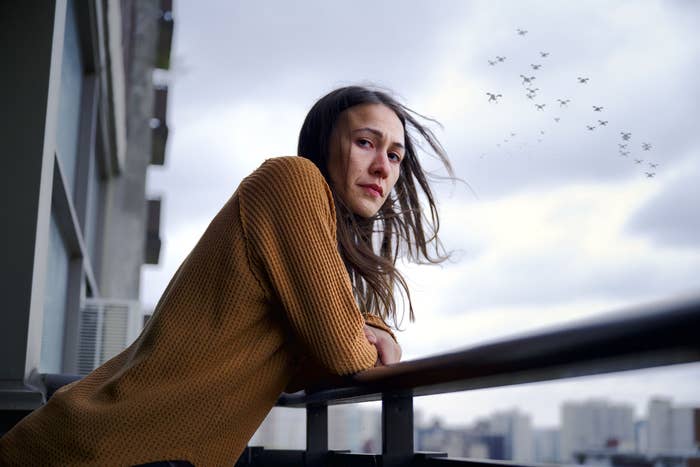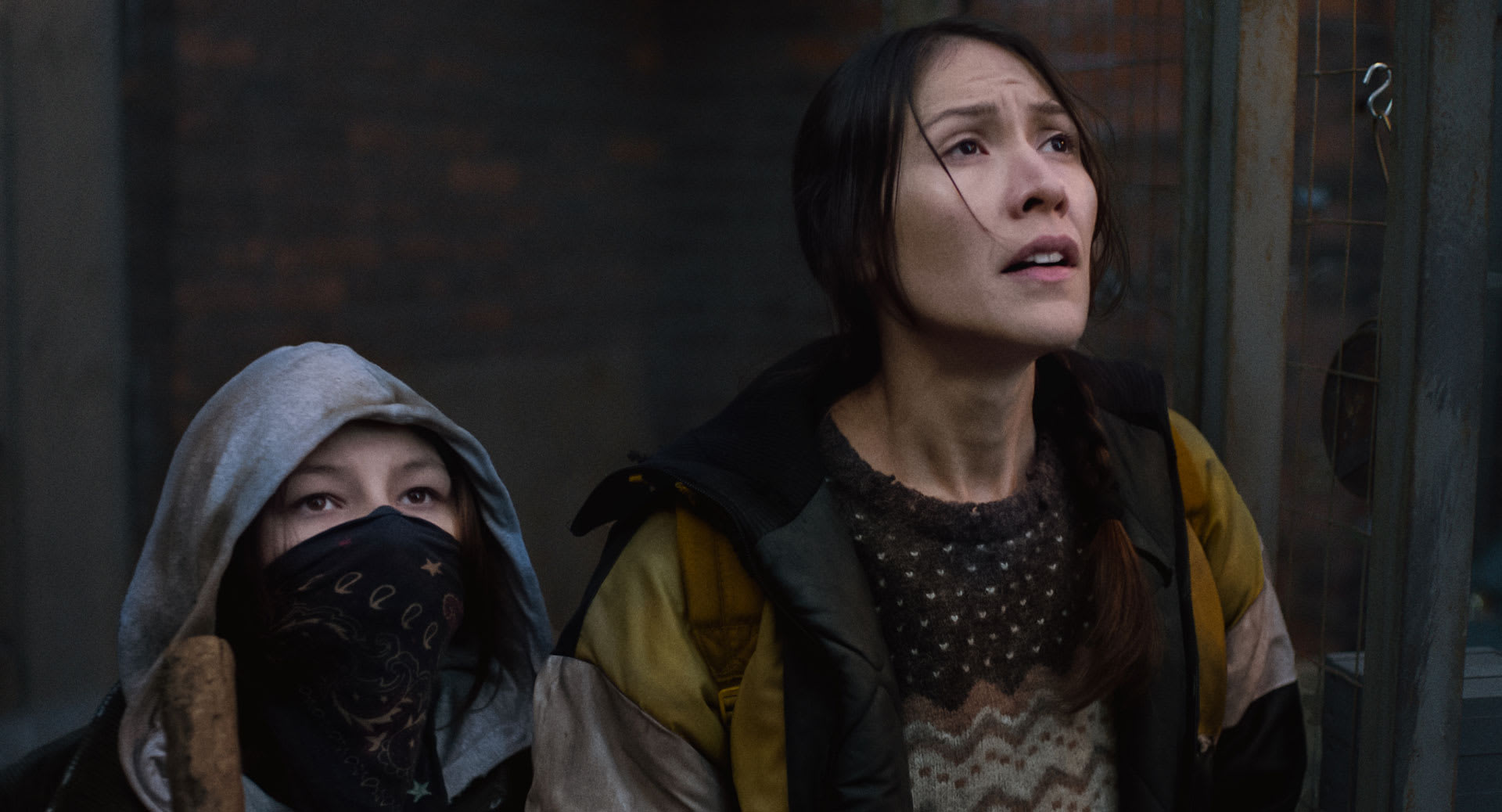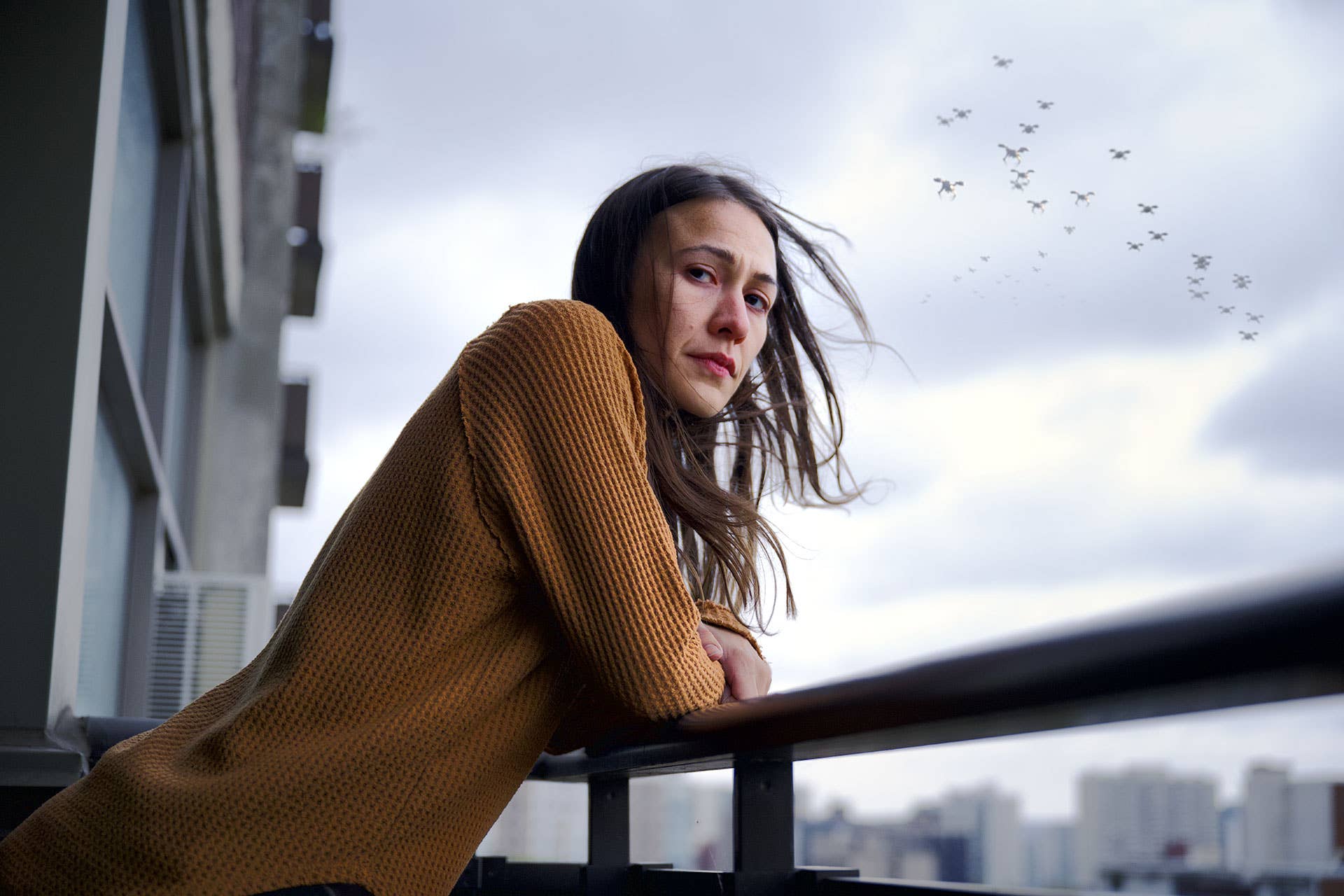
Even though Danis Goulet’s Night Raiders may be set some 20-plus years in the future, the dystopian sci-fi film has its eyes firmly on Canada’s shameful colonial past. (A past that isn’t nearly as distant as some might want to believe.)
Part of a growing wave of Indigenous Canadian genre films, along with last year’s zombie thriller Blood Quantum and Nyla Innuksuk’s upcoming alien invasion comedy Slash/Back, Night Raiders filters the horrors of Canada’s residential school system through a sci-fi lens. The result is a dystopian tale of a Cree woman (Blood Quantum’s Elle-Máijá Tailfeathers) whose daughter (Brooklyn Letexier-Hart) is taken from her and sent to a state-run school for re-education, where student are forced to pledge allegiance to the “great Southern nation.”
It’s a story the Cree-Métis filmmaker has long been itching to tell, first conceiving of the idea to channel Canada’s painful colonial history into fodder for a futuristic thriller back in 2013. (Back when the idea of a rising nationalist movement building a border wall and a fascist regime forcibly separating children from their parents felt slightly less uncomfortably prescient.)
Fast-forward eight years, and Goulet’s feature debut is set to come out in theatres on October 8th. It’s a little over a week after Canada marked the first National Day for Truth and Reconciliation, created as a way for the country to commemorate the horrible legacy of Canada’s residential school system, which operated from 1831 to 1998 and left behind intergenerational wounds that were reopened following the discovery of mass graves at former school sites in Saskatchewan and British Columbia earlier this summer. And while the timing may be a coincidence—Night Raiders was originally set for a 2020 release before being delayed by the pandemic—the similarities between the film’s fictional sci-fi world and Canada’s very real past certainly aren’t.
“The genre tropes lend themselves so easily to allegory, and I felt offered a fresh entry point into a way of talking about the topic,” Goulet told Complex over Zoom, shortly after the film premiered at this year’s Toronto International Film Festival, where it earned the writer/director, and former TIFF programmer, the festival’s Emerging Talent Award. (“It was such an emotional night,” she said of Night Raider’s Gala premiere. “I’m still actually just processing it, to be honest.”)
Much like Blood Quantum writer/director Jeff Barnaby told Complex last fall, Goulet felt Night Raiders’ genre setting helped create a safer space for cast and crew to explore such intense topics, while dramatizing the effect these policies had on children and their families, all in the hopes it would be a catalyst for reflection, and conversation.
“Even though everything in the film is based on real historical policies that continue to affect Indigenous people even now, if you set it somewhere imaginary or if you go into a more fictionalized world, it does offer protection to everybody involved,” she explained.
“I think that our people have experienced so much pain and trauma, and yet there’s this immense capacity for love. And I think that’s what really has moved our people through so much.”
(Despite being speculative fiction, there was at least one trope Goulet wanted to avoid though: “Even though there are fantastical elements in the world and in the story, how do you treat that in a way that feels real and has gravity and respect, and doesn’t just reinforce the ‘magical Indian’ stereotype?” she recalled. “Even the idea of ‘the warrior,’ it’s like, how do we treat strong characters in a way where they have complexity and nuance and they don’t just become an archetype?”)
That sensitivity also meant proceeding with the utmost caution when it came to filming certain scenes, including ones where children are hounded by military attack drones before being ripped from their parents’ arms. “It was really important to incorporate cultural practices that might keep us safe in moments like that and on the mornings that you go to do that,” Goulet explained. That included having smudging available, and giving space to cast and crew whenever needed. Sometimes, it even meant hitting the brakes, despite the fact that film production is a machine where everyone’s under constant pressure to go go go. “If there are times where we have to slow down and take a moment or take a breath in spite of the machine, we do that.”
“It’s about creating the space, even if it’s just a matter of talking to the entire crew about what we’re doing that day and signaling to them to create a space of care.”
For Elle-Máijá Tailfeathers, who plays Niska, a single mom determined to get her young daughter back, there was an “immense responsibility” to do her character justice. “Her story represents the lived experiences of so many women that I know within our communities,” she explained. “She represents so many Indigenous women I know, especially single mothers who are doing so much with so little. My mom was a single mother.”

That relationship, and the love between mother and daughter, was what guided her through Night Raiders’ more intense moments, she added. “I think that our people have experienced so much pain and trauma, and yet there’s this immense capacity for love. And I think that’s what really has moved our people through so much.”
“I think we found so much hope in our communities, in the resilience of our people, of our nations, in the love that has carried us through, in the experience of being together in the telling of this story as Indigenous people,” agreed Goulet, who said the experience of making Night Raiders was ultimately a hopeful one, in spite of the traumatic past they were mining. “Yes, it was hard. It was also joyful. There was so much laughter.”
“I really hope that through the telling of stories like these that it promotes more understanding and empathy.”
A Canada/New Zealand co-production—after Goulet’s longtime friend Taika Waititi came on board as an executive producer in 2018—Night Raiders holds the distinction of being Canada’s biggest-budget Indigenous-made film to date. The previous titleholder? Last year’s Blood Quantum—a sign that the Canadian film industry, and the entertainment industry at large, is finally beginning to come around to the idea that Indigenous filmmakers should be given an opportunity to author their own stories. (Crazy, I know.)
It’s part of the reason why it’s so powerful to see Indigenous culture and cultural practices centered firmly at the heart of Night Raiders’ narrative, and Cree not merely spoken in the film, but used in the movie’s title card and on the poster as well. “Luckily, I had creative partners that were always willing to embrace that element of the film,” said Goulet.
“Languages contain universes and worldviews,” she explained. “It’s a political act to include languages, because that is part of what we know was forbidden in the residential school system and also attempted to be erased.” (In the film, children are forced to recite “one country, one language, one flag” as part of the Academy’s pledge.)
It’s also why Goulet makes it a point to incorporate Cree into every project she does. “It is a way of doing my part to make sure that the language has presence, because of everything that is contained in it and how important it is,” she said. “Those that engage in language revitalization work, to me, are warriors.”
“When Canada and the genocidal policies that founded our country attempted to erase Indigenous people on our own land, you have to be resilient in order to survive,” Goulet said of the perseverance and resilience on display in the film, both in front of and behind the camera. “But it’s my hope that future generations will not have to be as resilient as the past ones have had to be and that we can support healing.”
When it comes to Canada’s future, then, the only way forward is by reckoning with the past.
“I really hope that through the telling of stories like these that it promotes more understanding and empathy,” offered Goulet. “But that it also makes people think about how they can become involved in building a better future for all of us.”


